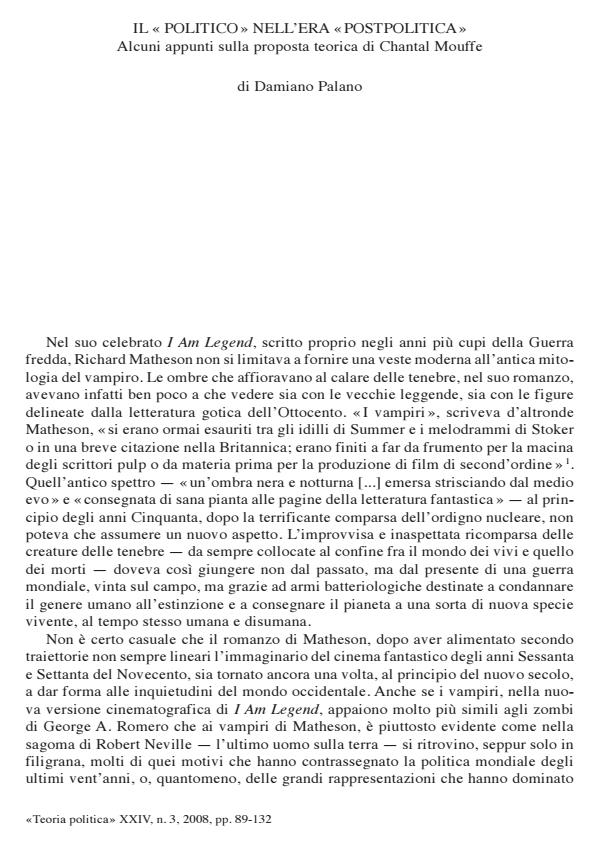Il "politico" nell'era "postpolitica". Alcuni appunti sulla proposta teorica di Chantal Mouffe
Titolo Rivista TEORIA POLITICA
Autori/Curatori Damiano Palano
Anno di pubblicazione 2009 Fascicolo 2008/3
Lingua Italiano Numero pagine 44 P. 89-132 Dimensione file 336 KB
DOI 10.3280/TP2008-003004
Il DOI è il codice a barre della proprietà intellettuale: per saperne di più
clicca qui
Qui sotto puoi vedere in anteprima la prima pagina di questo articolo.
Se questo articolo ti interessa, lo puoi acquistare (e scaricare in formato pdf) seguendo le facili indicazioni per acquistare il download credit. Acquista Download Credits per scaricare questo Articolo in formato PDF

FrancoAngeli è membro della Publishers International Linking Association, Inc (PILA), associazione indipendente e non profit per facilitare (attraverso i servizi tecnologici implementati da CrossRef.org) l’accesso degli studiosi ai contenuti digitali nelle pubblicazioni professionali e scientifiche.
The "Politica" in the "Postpolitical Age". Some Notes on the Theoretical Perspective of Chantal Mouffe - This essay concerns the reflection of Chantal Mouffe about the "politica" and the transformation of contemporary political systems. The paper reconstructs the main features of Mouffe's reflection, with special regard to the influence of Carl Schmitt and the concept of "agonistic democracy". For Mouffe, the friend/enemy opposition is the (not eliminable) hearth of the "politica", but this opposition is not the only form of antagonism. From Mouffe's point of view, "agoism" is a different mode of manifestation of antagonism, which involves a relation not between enemies but between "adversares", "friendly enemies" friends because they share a common symbolic space but also enemies because they want to organize this common symbolic space in a different way. The "postpolitica" age removes the enemy (even the "friendly enemy") from the symbolic space of western democracy, and enemy is represented as hostis generis humani. For this paper, Mouffe's perspective offers an important contribution to contemporary political debate, but the study shows a danger in her interpretation of Schmitt's political theory. For the German thinker, the amicus/hostis opposition is rooted in a spatial conception of the "politica", but Mouffe fails to consider this crucial aspect of Schmitt's reflection, with consequences on the image of the "postpoliticalage". In fact, without a spatial ground and without attention to the contemporary "spatial revoluton", she achieves a form of theoretical "voluntarsm" and moves toward a moralistic vision of the moralization of politics.
Damiano Palano, Il "politico" nell'era "postpolitica". Alcuni appunti sulla proposta teorica di Chantal Mouffe in "TEORIA POLITICA" 3/2008, pp 89-132, DOI: 10.3280/TP2008-003004